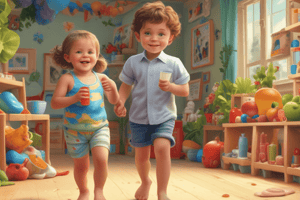Podcast
Questions and Answers
What does the term 'growth' specifically refer to in pediatric studies?
What does the term 'growth' specifically refer to in pediatric studies?
- Increase in skill or ability to function
- Increase in physical size or quantitative change (correct)
- Observable actions or responses of a person
- Process of attaining full development and maturity
At what age range does the 'toddler' stage occur?
At what age range does the 'toddler' stage occur?
- 1 year old - 3 years old (correct)
- 1 month - 12 months
- 4 - 6 years old
- 0-28 days of life
Which of the following statements best describes a pattern of development?
Which of the following statements best describes a pattern of development?
- All children develop at the same pace
- Development occurs randomly throughout life
- Development passes through predictable stages at different rates (correct)
- Children do not lose neonatal reflexes before development
What is meant by the term 'cephalocaudal' in development?
What is meant by the term 'cephalocaudal' in development?
In the context of growth, what does 'proximodistal' refer to?
In the context of growth, what does 'proximodistal' refer to?
What is necessary for development to proceed after the neonatal stage?
What is necessary for development to proceed after the neonatal stage?
Which of the following is NOT a characteristic of growth and development patterns?
Which of the following is NOT a characteristic of growth and development patterns?
What does the term 'maturation' signify in pediatric terms?
What does the term 'maturation' signify in pediatric terms?
Flashcards are hidden until you start studying
Study Notes
Definition of Terms
- Pediatrics: Derived from Greek, it refers to the study and care of children in both health and illness.
- Pediatrician: A medical doctor specialized in pediatrics.
- Growth: Indicates an increase in physical size; a quantitative change.
- Development: Refers to the increase in skills or abilities; a qualitative change.
- Maturation: The process of achieving full development and maturity.
- Eugenics: The scientific study aimed at improving hereditary qualities in future generations.
- Personality: Totality of an individual's inherited and acquired traits and their interaction with the environment.
- Behavior: Observable actions or responses of individuals to social stimuli.
Basic Division of Childhood
- Newborn: 0-28 days of life.
- Infant: 1 month to 12 months.
- Toddler: 1 to 3 years old.
- Preschool: 4 to 6 years old.
- School Age: 7 to 12 years old.
- Adolescent: 13 years old and above.
Patterns of Growth & Development
- Continuity: Growth and development are ongoing processes from conception to death.
- Orderly Sequence: Both growth and development follow an organized and recognizable sequence.
- Predictable Stages: Development progresses through specific stages at varying rates.
- Cephalocaudal Development: Growth progresses from head to toe.
- Proximal to Distal: Development moves from the center of the body outward.
- Gross to Refined Skills: Skills develop from large, gross motor movements to fine, refined movements.
- Optimum Timing: There are ideal times for initiating learning experiences.
- Loss of Neonatal Reflexes: Certain reflexes must disappear before further development can occur.
- Practice: Many skills and behaviors are acquired through repetition and practice.
Studying That Suits You
Use AI to generate personalized quizzes and flashcards to suit your learning preferences.




